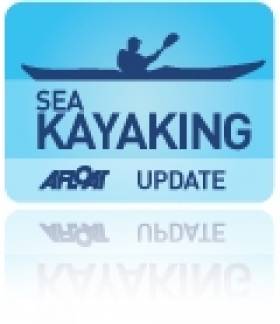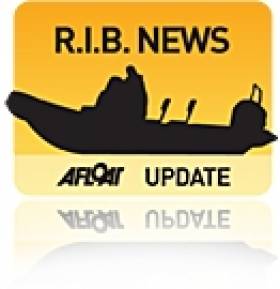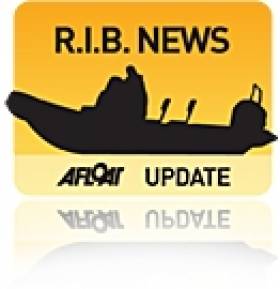Displaying items by tag: Padstow
Exhaustion Takes Toll On German Kayaker Off Cornwall
#Kayaking - Just days after embarking on an ambitious kayaking expedition from Kinsale to Germany, pizza oven company boss Hendrik Lepel was picked up by the RNLI after calling for help off Cornwall.
Padstow's volunteer lifeboat launched around 12am in the early hours of yesterday morning (Thursday 25 June) to rescue the German kayaker, who was suffering from fatigue after 30 hours at sea and unsure how to reach Padstow Harbour.
Quickly locating the four-metre kayak The Flying Northman, which was set up with an outrigger and sails, the crew took the tired casualty onboard and towed the kayak into Padstow where his support crew were waiting.
"It was a beautifully calm and flat night, with very light winds," said deputy second coxswain and mechanic Michael England. "The chap had been at sea for 30 hours and was extremely tired.
"Although he was also equipped with an outboard engine, he’d used the fuel and under sail it would have been a long passage into Padstow. Unfamiliar with the area, he was also unsure of the best way into the harbour.
"He did exactly the right thing to call for help, and although it was a late night for the crew, we didn’t get back to the station until 2.20am, we were happy to help him out."
Here's hoping Lepel – who admitted earlier to "not being experienced" at offshore kayaking – can resume his journey to Rostock in time to meet the tall ships without further incident!
#KillCord - An official report into the tragic speedboat accident in Cornwall earlier this month that killed a father and daughter says that the driver was not attached to the boat's 'kill cord'.
As previously reported on Afloat.ie, BSkyB executive Nick Milligan and his eight-year-old daughter Emily were struck by the family's runaway RIB after being thrown overboard from the vessel on the afternoon of Sunday 5 May.
Four other family members were struck by the runaway boat as it circled in the water off Padstow. Nick's wife Victoria and four-year-old son Kit are recovering after sustaining "life-changing" leg injuries.
Police were reportedly investigating the role played in the incident by the boat's kill cord or safety lanyard, a device attached to the throttle that should automatically cut engine power if the driver is thrown from the vessel.
Now The Guardian reports the Marine Accident Investigation Branch's (MAIB) conclusion that the 8m Cobra RIB was fitted with a kill cord, but it was not attached to the driver.
It has not yet been determined who was driving the speedboat at the time of the accident, nor is it clear how the family was thrown from the vessel.
The report added: "The kill cord serves only one purpose, to stop the engine when the driver moves away from the controls.
"To ensure that this tragic accident is not repeated it is essential that all owners and operators of vessels ensure they are fitted with kill cords."
Police Focus On Kill Cord In Cornwall RIB Tragedy
#KillCord - Police in Cornwall investigating the deaths of a father and daughter in a speedboat accident off Padstow at the weekend are focusing on the boat's 'kill cord', according to BBC News.
BSkyB executive Nick Milligan and his eight-year-old daughter were struck by the family's runaway Cobra RIB after losing control of the vessel and being thrown overboard.
Four other family members in the water struck by the 8m-long boat were hospitalised, with the BBC reporting that Milligan's wife Victoria and four-year-old son Kit suffered "serious, potentially life-changing injuries".
Witnesses describe the speedboat circling to hit the family after turning sharply and throwing them into the water, then continuing to run around in circles before it was stopped by local waterskiing instructor Charlie Toogood who jumped on board.
Investigators are looking closely at the kill cord or safety lanyard, a device attached to a boat's throttle that should automatically cut engine power if the boat's pilot goes overboard.
A malfunctioning kill cord was identified in an incident in Cork Harbour last summer in which a RIB pilot lost an arm after he was thrown overboard and subsequently struck by his runaway vessel, as previously reported on Afloat.ie.
Months before, an angler died and another was treated for hypothermia after being thrown overboard and separated from their vessel, a result of neither man using the kill cord on their boat's engine.


























































